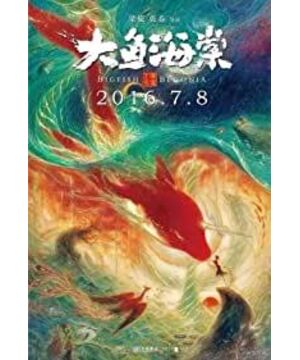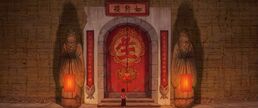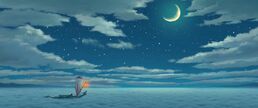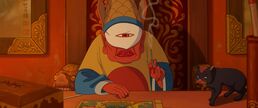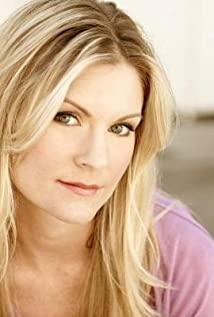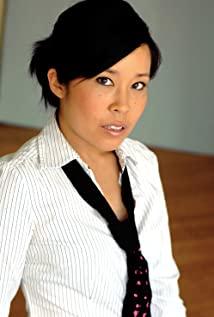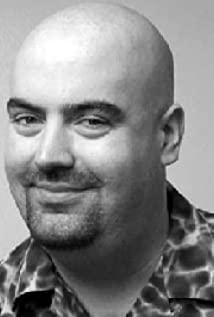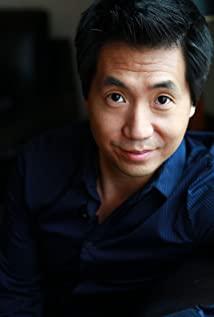If there is no influence of conformity, everyone's original likes or dislikes are justified. Yet people seem likely to be implied by situations and crowds. For example, at first I thought, "Big Fish and Begonia" is not that bad. I already presume that it is bad. I also thought about the idealistic debut of two new directors. There will always be shortcomings and deficiencies, so I will also I think the picture and music are good, and the plot dialogue is bad. When I look back after a while, I find that the plot is also intentional, and the previous conclusion is still arbitrary.
Serious spoilers below. However, I think this film can withstand spoilers, and it can also withstand second and third rewatches (more difficult to say).
Many details in the film, some are the key to the plot, and some are just the icing on the cake. As for whether the main plot frame of the movie is brocade or rags, it is left to everyone to judge for themselves.
# Pull sheet notes
: "There is a fish in Beiming, its name is Kun. Kun is so big, I don't know how many thousands of miles it is." The
old man Chun monologue at the beginning of the film: Our life is like crossing the ocean.
Tagore's Stray Birds 242: THIS life is the crossing of a sea, where we meet in the same narrow ship. / In death we reach the shore and go to our different worlds. Like crossing a sea, we are all gathered in this small boat. / When we die, we arrive at the shore and go to our own worlds.
Old Chun's monologue: ... these big fish are the soul of human beings. In fact, from birth, they never forget.
The picture is the fetus in the amniotic fluid. The law of biological recapitulation holds that the developmental process of individual organisms is similar to the evolutionary process of species (of course, it is not strictly recapitulation).
A group of whales swim from high to low, crossing three layers in turn: the upper layer is the cloud layer, the middle layer is the thunder and lightning, and the lower layer is the sunny mountains and rivers. Alludes to the dangers of crossing two worlds.
It seems to be a general rule that getting from one comfort zone to another is a difficult process. Such as "Looking at a mountain is a mountain", "Positive and negative", "Three stages of kingdom dimension" and other allusions.
Yin mother demonstrates to Yin the changes of the operation cloud. Yin is learning by imitation. The clouds in the sky turned into dolphins and then into horses.
The Quanquan family passed downstairs from Mother Yin. Circle circle, with many circles on the face, such as disks, long hair and naked body, more motionless.
A bamboo hat was blown by the wind of Mother Yin to the side of Chi Songzi in the water. "Legend of Immortals": "The red pine seeds are also the rain teachers of Shennong. They take water jade to teach Shennong, and they can burn themselves into the fire. They often go to Kunlun Mountain, often stop in the stone room of the Queen Mother of the West, and go up and down with the wind and rain. The girl of the Emperor Yan chased him, and also All the immortals will go away. At the height of Xin's time, he will be the rain master again, and the rain master today is originally." It is no wonder that he and Zhu Rong have a very strong friendship.
The ancestor of the lei (léi) weaving by the water. "Tongjian Wai Ji": "The daughter of the Xiling clan, Leizu, was the concubine of the Yellow Emperor Yuan, who treated silk cocoons for clothing, and later sacrificed as the first silkworm." See also "Shan Hai Jing Hai Nei Jing".
The inspiration for weaving the starry sky on the water comes from "The Preface to the Pavilion of King Teng", "The autumn waters are long and the sky is the same color".
The horse on the grass beside Leizu was inspired by the Eight Horses.
The red seal on Leizu's forehead is very similar to Kun and Kunmei.
Chunqiu rode past the Lama Bird family.
Terraced fields. It is unknown whether the prototype is Yunnan or Fujian.
The two rode past a large tree with a bird's head. The passers-by under the tree are a family of hairy people.
The prototype of the surrounding building for the coming-of-age ceremony and Pei (Qiu's grandmother) to open the Gate of Haitian is Shengwu Building.
Grandma Qiu's opening ceremony may have referenced Nuo opera.
At the coming-of-age ceremony, Grandpa Houtu gave an opening speech. From left to right: Shu (rù), Zhurong, Chisongzi, Houtu, Ju (gōu, the same hook) Mang, Deer God, God of Fear. The word on the lantern at the rear is "sai".
The idea of "automatic without wind" of character ribbons and hair comes from Chinese murals and Chinese paintings. This "fairy spirit" seems to be a unique setting in Chinese animation.
The characters have their own origins.
The line "Brightly up in the sky, shining down on the earth." "God hears it, Jie Er Jingfu." From "Book of Songs, Xiaoya, Xiaoming".
Mentions the ban on "must never have any contact with humans".
At the coming-of-age ceremony, Chun was behind his mother Feng, his father Shu, and his grandfather Feng (studying in piě, I thought it was no). Next door are the Tingmu brothers and sisters and their family.
Feng reminded that the whirlpool is the only passage between the two worlds.
Feng's admonition is like the mother of many children before they leave for a long journey.
The elf who delivers and pours soup, whose name is unknown. The pattern on the forehead of the elf on the tray is Kan hexagram (the upper and lower yin lines, the middle yang line, "the ridge is full"), which symbolizes water and danger.
On the roof of the enclosure, Qiu, who was seeing Chun off, shouted, "Chun, be careful all the way, and wait for you to come back." This sentence was ignored for a while, but felt very emotional when it was written again.
Seven days in the world, I met a river lantern. The custom of putting river lanterns is usually the Zhongyuan Festival on the fifteenth day of the seventh lunar month.
The human boy Kun blows a dolphin-shaped Xun (xūn), which is called a flute (ocarina) in the film. When Kun and Kunmei feed the fish, the sound of the ocarina is blown, but then the sound played by Kun and Chun is the xun. .
Tsubaki, in the form of a dolphin, was about to return to the whirlpool and was caught by the purse seine.
When Kun went to rescue, he jumped into the whirlpool side of the seine.
Chun Yin's mother reminded him to be careful of humans, and he saw turtles and dolphins being hunted by humans. After being cut by Kun's knife, he slapped Kun away in panic, and Kun was trapped in a whirlpool.
The surrounding building and its prototype are Chaoyuan Building. "Feng" is written on the lantern outside the room. There are acupuncture portraits and landscape paintings in the room.
Chun's grandmother is in charge of all the birds, and after her death, she turns into a phoenix, and drives the little bird to tie her hair. Warm.
Peng's hair turns into a river in the transition, and Chun walks by the river alone. A very good picture similarity transition.
Chun alone was blowing at the Pixiu Cliff Pier.
The spirit woman behind Pixiu heard that Xun did not belong here, learned that its owner was a dead human boy, and offered to help Chun.
Sound transitions. From the last sentence of Pixiu to the memory of Tsubaki in the night.
There are many potted plants in Tsubaki's room.
Close-up of Tsubaki's desk drawer. The items on the table are white porcelain vase (what kind of flower is the pattern), blue-dyed purse, ring, rouge box, bookmark (suspected), ocarina in the drawer (no wonder Tsubaki can play xun), Bolang drum, Unidentified wooden musical instrument, mahogany storage box.
From the mahogany box, take out the walnuts given by Pixiu (Spiritual Po), and close-up the yin-yang fish pattern on it.
Liang Xuan said in the interview: "Kurozawa Akira will also ask that even if the drawer will not be opened by the plot, the contents inside should be put in order. This is a responsible attitude. Once you have this attitude, every member of the crew will It takes an individual to have such an attitude."
Tsubaki has an earring in her right ear that glows when she's thinking, surprised, or determined. For example, when taking walnuts to look for a spiritual woman, when a little mouse recites the Kun from the sewers, and when he decides to sacrifice himself to mend the sky.
Chun turned off the lotus lamp and tiptoed past his mother's room. The door was filled with black letters "Phoenix" on a red background.
Tsubaki went out with a pot of pentagon-shaped flowers.
Original plot setting: Tsubaki's mother is in charge of plant growth, and she usually grows potted plants to distribute to people in the world of gods. Tsubaki uses flowers to cover the door. On the way, she encounters her father drinking with a group of friends. This section was cut from the final film.
Close-up of the front of the surrounding building where Chun lives, Chengqi Building. Tsubaki was walking in the direction of 5 o'clock, which matched the map setting.
Chun put the flower pot on the covered bridge, and the prototype of the covered bridge is Jixing Bridge. "Water" is written on the lantern on the bridge, the person sleeping on the bench and the animal in the bamboo basket are unknown, and the person and the animal in the bamboo basket appear in the Deer God's Tavern.
Chun crosses the thin line of sky. The prototype "One Line of Sky" is between Chengqi Building (circle) and Shize Building (square), and there are changes in the film.
Qiu sat on the windowsill of the square building, using the autumn wind to ripen the fruit.
The window sill of the square building, the direction of the tree, and the location of the flower pot are consistent with the map setting.
Qiu's door is marked with "Qiu" in black on a red background.
The animal on the stone steps is Dijiang (the ancient pronunciation of "jiang" and "hong" are connected). From "Shan Hai Jing Xi Shan Jing".
The boatman in the sea of clouds waved to Chun with three hands, and invited her to board the boat.
The three-handed boat, the wooden dragon head, the fish tail, and the bamboo canopy are covered with patterned cloth with gold border and black background.
The animal jumping out of the sea of clouds is a horse with whiskers in the front, and a fish in the back.
Lingpo's is like ascending a building. The word "sheng" is written on the door, and the lintel reads "such as ascending a building", with couplets on both sides: the color is the empty lotus, the sea, the compassion, the six degrees of sailing, the immortal and immortal incense platform Huijing Qi Sanming (from the Lama Temple in Beijing). Fish-shaped lanterns on both sides.
The pig head door decoration, when opened, is the yin and yang fish door lock, which corresponds to the yin and yang fish pattern on the walnut. "Zhitian Lu" "The door lock must be a fish, whichever means it is not a night watch". Fish can't close their eyes and can keep watch, but the pigs outside are sleeping.
Four black cats carry the sedan chair, "fish" is written on the lantern, and the word "Dehe Shenyu" is written on the sedan chair curtain, and the pattern is a horned beast. The spirit woman's hat and mask are in the shape of a fish, and her pet is a group of cats. According to ancient books, the golden-eyed night light is the best for cats, followed by snow-white, and black is the most unknown. Cats value their young sons, one is expensive, the other is stupid, the third is cheap, and the fourth is to carry a sedan chair.
Lingpo's room is imitated in the shape of an official government office. The plaque on the top reads "Xunzi: Theory of Heaven", which echoes Lingpo's statement to Chun that "heaven travels the way". There are four landscape scrolls behind the seat (inscription inscription). On the right side are the wooden signs of "Granting the Political Doctor", "Avoid" and "Silence", the left side has a crane-shaped smoker, and in front of the smoker is a phoenix-headed Konghou (the front side when playing mahjong). ), the case has a lottery tube, a life and death book, a red-glazed white porcelain seal box, a square seal, a black lacquered wooden box (with a stick insect figure on the cover, and a stick insect inside, which is the cigarette smoked by the spirit mother), a white porcelain base Spherical lamps (the lampshade pattern is water patterns and red fish, and the base pattern is begonia flowers), etc., there is a pair of eyebrows in front of the case, there are red dots between the eyebrows, and there are water patterns at the moment.
Chun said that the day Kun died, the day she returned from the world, was also her birthday: two days before Gu Yu, on April 18. Some people think this implies that the seasons of the two worlds are different.
According to the current lunar calendar, Grain Rain is the middle gas, which is fixed in the third month of the lunar calendar. The statement of April 18 in the film seems to be the Gregorian calendar.
The cover of the book of life and death is the picture of the fetus at the beginning of the film.
There are the names of the staff of Bi'antian on the life and death book. Among them, the page of the Bingyin year, Renchen, Yue, Xinmao, and Yinshi, reads "Liang Xuan died at the age of eighty-six because of a drunken life and a dream." On the same page, there are two drowning dead, Ling Po. The last point was "Yang Yinjie died of drowning at the age of eighteen" next to Liang Xuan's left (so this is Kun's real name and age in the world).
The most recent Bingyin year, Renchen month, Xinmao day, was April 17, 1986 according to the Gregorian calendar.
Lingpo said that he had practiced here for eight hundred years, and he still hadn't been able to pay off what he owed back then.
Lingpo extracted the soul of the toon in the room where the soul was stored. One petal was injected into the Kun, and the rest was put into a red-lined sachet with a black embroidered fish figure and thrown into a covered dragon-patterned copper jar, which contained many of the same incense. bag. The plaque above is "Huina Wanchuan". There are many mysterious bottles and jars in Duobaoge behind him.
At dawn, Qiu was sleeping holding the pot of flowers that Chun had placed on the covered bridge. There was a face on the flower pot, and his eyes were rolling.
Chun is talking to Kun. A gust of wind from Qiu dried up the three potted flowers on the window sill of Chun, and Chun made them bloom again. Several flower pots have moving faces.
Qiu said, "Fish can't be raised here." But none of them knew the reason for the ban and what the consequences would be.
Chun dreamed of the resurrected Kun, and the background prototype was suspected to be the Chaka Salt Lake in Qinghai.
The white cat that Feng raised was like a cat, and the animal that licked the rain and fried its fur was Bai Ze, so Feng found that the rain had become salty.
The door of the corridor of the outer building of Chunmen Gate has couplets on both sides: clear like thin bamboos and idle like cranes, the seat is the spring breeze room and the orchid, horizontal batch: bamboo dragging flowers dance. On the curtain is a flower pattern.
Qiu lay on the roof watching the big fish swallow the moon. The prototype appears to be the Huanjilou. The layout of the film has been changed, and a square building has been added in the middle, symbolizing a round sky and a place.
Tsubaki's parents were eating, and the word "dirty" was written on the object that looked like a trash can.
The Rat Woman said she had seen the fish and knew it was from the Rat Woman.
Fireworks night. The firework pattern is BOBOTOTO, a cartoon character of the other side of the sky.
The surrounding building with lanterns and colorful operas is Yanxiang Building.
On the top of the stage is a line of large characters that reads "Coming of Age Celebration Conference". "Spring Equinox" is written in black on a white moon-shaped lamp on the upper left. (So in Tsubaki's world, the solar terms are chaotic or reversed.)
Yin found Kun in the well while playing hide-and-seek. Yin's logo is a cloud floating over his shoulder.
Chun and Qiu removed Kun from the well, and the field was full of fireflies.
Qiu was attracted by the sound in the coffin, opened the lid and was bitten by a two-headed snake. The two-headed snake may be the incarnation of the snake master in the official character design. In the movie footage, it cannot be determined whether the two-headed snake originally attacked Kun or Chun, but the official statement is that he sensed the existence of Kun and deliberately made a sound to attract attention and wait for an opportunity to attack.
The song Chun Beiqiu sang when he went to find his grandfather was Eason Chan's theme song "Meet in this World".
Feng helped Qiu to suck out the snake venom, and a cloud shrouded Chaoyuan Building.
The fence gate to the green duckweed pond is hung with a lantern that reads "floating".
Chun watched as a horned face appeared on the stone Qiu gave her.
Qiu makes a face to scare Chun. The bird startled away by the pond is the jujube. "Book of Songs, Zhou Nan, Guan Ju" is the first poem in the Book of Songs, and it is basically known by women and children: "Guan Guanju is in the river continent. A slender lady, a gentleman is a good man."
Pi looked at the chunqiu on the grass from the window. This shot is very emotional. The almost indulgent love of an old man for a young man.
At night, the lights of the Chaoyuan Tower are extinguished, symbolizing the death of Feng.
Before he died, Feng said to Chun: "I know you are doing a very dangerous thing, and everyone will oppose you. As long as your heart is kind, right or wrong is someone else's business. Go according to your own heart, Grandpa. It will turn into a begonia tree, together with grandma, and will always support you."
When Feng died, all the birds came, Chun and Qiu mourned for grandfather, but Chun's parents and other clansmen did not show up. It is also strange that Feng lives alone in Chaoyuan Building, far away from the clan.
Jumang: "Summer is flying frost, the seasons are already out of order." Jumang's hat is a swallow.
Chun and Qiu were watching the snow on the top of the building, which was the same building as Qiu who was watching the moon in front of him. At this time, Qiu learned that Chun had exchanged half of his life for Kun.
Chun was called away by Feng, because the clan began to suspect Chun, "Let her explain to us clearly" seems to be Zhu Rong's voice.
The rat mother reminded Qiu to put Kun into the frozen river in the back mountain.
Qiu sent Kun into the glacier. Chun jumped into the glacier to chase, and was caught in the current, which seemed to be premeditated.
The rat mother arranged a sapling. The footage showed that the rat woman would scorch when exposed to sunlight. But the shot was too short, and the cut was a little abrupt.
The rat's mouse, under the command of the rat (a snap of fingers), took the opportunity to steal Chun's xun. But her mouse also brought Chun and Kun to the sapling, where they are expected to leave the ice cave.
The prototype of the mouse diving seems to be a lemming jumping into the sea.
Chun manipulated the sapling to grow up and took himself and Kun out of the ice cave.
After Qiu found them, he originally wanted to leave with Chun on his back, but after hesitating for a while, he brought Kun with him.
Qiu found Chun in a coma and got Ling Po's walnut.
Qiu carried Chun and Kun on his back to the Weedcao Enclosure. The name of the monster that hummed like a frog on the roof is unknown.
The patio, the prototype may be the ancestral hall of Yanxianglou. Plaque "Golden Mother Longevity".
Qiu saw Chun and Kun talking outside the door and left.
Qiu Huan laughed and drove away the Dijiang River on the stone steps, and ran up the Pixiu Cliff. This cheerful mood is a little strange.
With a loud shout, Qiu summoned the three-handed boat, who took off his hat and bent over to greet Qiu. Qiu climbed onto Sanshou's head, and then found the silken umbrella Tsubaki left in the cabin.
The four mahjong wives (three of them are fake) have different body shapes, eyes, and voices (in terms of voices, the voices of the two families are actually similar). All voiced by Jin Shijie.
The three fake ghosts correspond to greed, hatred, and delusion respectively, but there are too few scenes in the film, and the performance is not obvious. It is really ironic to connect with the couplet of a rising building.
Qiu learned from Lingpo that if Kun died or sent Kun away, Chun would die.
Qiu plays mahjong to win the card is one barrel six barrels three barrels four barrels, meaning "think twice all the way". This is a reminder from the spiritual woman that the decision (and discord) is in Qiu's hands, but Qiu doesn't seem to realize it, just like many young people can't understand the old man's words.
Lingpo told Qiu, "The method is in your hands (walnuts)" and whispered a few words to him.
Such as ascending the central patio of the building, the stream of souls flows down from above like the Milky Way.
The old lady sent Qiu out: "Hmph, you little guys, treat life like a stone on the side of the road. Only the old guys like us will try our best to live an extra day."
Qiu saw Chun riding on Kun's side. Flying on the body (subtle filth), and went to the tavern to get drunk in despair.
The Tavern of the Deer God is a big hollow tree beside the waterfall.
Deer God's lines are like the tone of a psychologist.
The deer god has a human head and a deer body, and its tail moves when speaking.
Qiu Jiu came to the cliff by the waterfall and shouted, "It's the love of a god."
When Qiu was drunk, the flood came.
Pei: "The sea is pouring back, and the sky is angry."
Houtu: "Ominous things must be removed."
(The next clip, the rhythm is very tense.)
Houtu came to find the mouse, and the mouse said that she knew the big fish was there Nah, "Unless the seal is lifted, let me see the sunshine again." The
camera cuts to Ling Po: "There are a lot of dirty things down here, it should be washed well."
As the rat sang "The wind is also strong, and the rain is also strong ." The flood flooded thousands of homes.” The flood was even bigger. The Rat Woman transforms into a young form under lightning. Indicates that the seal has been lifted. This seal is really cruel: can't see the sun + looks old.
The hairy man came and told Pei Longwang that the mask was gone.
The clansmen took the hound-like mythical beasts to the barren grass building and found Chun and Kun who were still flying. Feng was very angry with her daughter, but still reluctant to give up; Zhu Rong and Chi Songzi attacked Kun.
The water dragon fended off Zhu Rongchi's fire and water attack, Qiu opened the sky with the dragon king mask, and said to Chun, "I will help you send Kun home, you must go with Kun." Hou Tu: "Oh heaven."
Kun tried to fly , but could not enter the gate of sea and sky.
The rat mother took the opportunity to enter the gate of Haitian: "I can finally return to the world, little handsome guy, thanks to you, no token in the world can't pass through the gate of Haitian." Houtu: "It's a sin."
Dragon King Mask It broke, the staff flew away, and the Gate of Sea and Sky was out of control.
(The rhythm pauses.)
After Chun and Kun woke up, they were under Grandpa's Begonia tree. Silent. In the distance is the out-of-control water column of the Sea and Sky Gate.
(Then goes to the next climax.)
Chisongzi rides a crane and takes Yin and Pei to rescue Tingmu's sister. Qiu and snakes, mice and other small animals float on a piece of wood.
When he came back from the rescue, Pei asked, "Have you seen Qiu?" Chisongzi didn't answer, but said, "Tingmu is still in the water, I'll go find him." Zhu Rong also went with him.
Zhu Rong found Kun and wanted to destroy it. Chi Songzi thought it was important to save people, but Zhu Rong said that it would cause even greater disasters, Chi Songzi hesitated and agreed.
Kun was attacked by Zhu Rong. Chun asked grandpa "what should I do". The begonia tree incarnated by grandfather spontaneously ignited, summoning the phoenix incarnation of grandma. Inspired by Phoenix Bathing in Fire.
Back soil blocks a larger wave of floods with clods (soil spells).
Jumang and Feng (wood spells) began to build bridges.
Chun stopped Zhu Rong's attack and begged them to spare Kun. Chi Songzi told Chun that "Tingmu was swept away by the flood, and his sister was waiting for him."
Chun came back to help the clan, and saw that Tingmu's cry was the same as Kun's cry (an overlapping shot). Only when I intuitively feel the cruelty of the consequences. Feng Zai wept silently, but Ting Mu's mother interrupted Chun's help, and Hou Tu said, "Child, let's go."
A larger water column poured down, and several people used magic to drive the water. The front is from left to right: Yin, Yinmu, Pei, Chisongzi (water magic), Zhu Rong stood on the far right (not casting spells, and then quietly held Chisongzi) hand).
Seeing that everyone was exhausted, Chun decided to atone for their sins and blocked the flood with the help of grandpa's begonia tree. Inspired by Nu Wa mending the sky.
Tingmu and everyone were saved. Feng Fu cried bitterly on the begonia tree. The others watched silently.
Kun wailed among the begonia trees.
Long closeup of begonia tree and falling flowers.
Kun brought a branch of Begonia in his mouth, Ling Po injected Chun's soul into the branch of Begonia, Chun was resurrected, and put on the clothes that Lei Zu woven for her. Lingpo: "This disaster has made land and water connected... Don't thank me, I'm just a businessman. (Silent words: If you want to thank the person who changed your life back.)"
Ye, the island of dead trees. fire. Qiu's test. Tsubaki's "Good Person Card". Qiu sobbing.
White Bird Bamboo Forest. Birds are the same as bamboo leaves. Bamboo leaves fly and become birds, and birds fall on bamboo tips and become bamboo leaves.
Use the bird falling on Kun to switch the scene to Nanming Fish Cliff.
Qiu used a magical (which he didn't seem to know before) to open the door to the sea and the sky, and the imprint of the spell was the yin and yang fish.
With the help of Qiu, Chun was wrapped in a golden air mass, turned into a begonia flower, flew into the gate of sea and sky, and then turned into a dolphin and went to the world.
Kun woke up by the sea and spat out a small fish. The small fish swam in the direction of the camera and pushed the camera back, and Chun appeared. On Chun's neck hangs the human face stone that Qiu sent.
This kind of technique of using a small object to move the camera is very familiar. It works very smoothly here.
The red ink marks at the end of the credits by the cast and crew are the enlarged part of the calligraphy of the title of "Big Fish and Begonia".
Theme song 1 is Eason Chan singing "Meet in this World". Echoes the encounter at the end of the main film.
Easter egg at the end of the film: The third hand brought back the pile of autumn leaves that Qiu turned into, and the spirit mother resurrected him and made him his successor. There is a line in Feng, "For us, death is the door to eternal life."
The soul of Qiu that Lingpo took out from the sachet was a yellow leaf, and the soul of Chun in front was a flower.
Tagore's Stray Birds 82: LET life be beautiful like summer flowers and death like autumn leaves.
Behind the easter eggs, there are subtitles with gold characters on a red background: "In ancient times, there was a big chun, with eight thousand years old as spring and eight thousand years old as autumn." Add a seal icon with the words "big fish and begonia".
Theme song 2 is Xu Jiaying singing "Qiu Xi Ru Feng". Echoing the Easter egg.
"This evening and this evening, see this good person." From "Book of Songs, Tang Feng, Precautions". "As constant as the moon, as rising as the sun." From "Book of Songs Xiaoya Tianbao".
Theme song 3 is Zhou Shen singing "Big Fish".
# Regarding the title
"Big Fish Begonia", there are two English titles: "Big Fish & Begonia" and "Big Fish & Chinese Flowering Crabapple".
There appears to be a deliberate mix of herbaceous begonias of the Begonia family Begonia (such as Begonia semperflorens, "Acacia") and woody Begonias of the Rosaceae apple genus (such as Xifu Begonia Malus micromalus, "Jieyuhua"). The Begonia flower controlled by Chun is the former, and the Begonia tree incarnated by Grandpa Chun is close to the latter.
Therefore, according to the setting that Big Fish represents Kun and Begonia represents Chun, the title of the film actually implies a word: "Big Fish (Qiu) Begonia", Qiu Begonia can fully represent Chun.
Chunqiu CPs can smile now.
# My understanding of the plot
first felt that the director's ambition was really big. And it's not very bad, and the personal evaluation is at the level of 9.0/10.
The first level of the plot: beautiful vision, bizarre life scenes, characters, and many gag clips; the story is that Tsubaki made efforts to undo his mistakes, brought disaster, sacrificed himself, and everyone among them. Scenarios of fighting disaster together. This may be intended for a child audience, with the themes "make mistakes - fix them" and "beautiful and fun".
The second level of the plot: grow up by guarding the big fish and overcome the opposition of those around you, symbolizing the pursuit of self. The theme is "Freedom" or "Dream".
The third level of the plot: love triangle, and Tsubaki knows that people from two worlds cannot be together, and Qiu is very clear that Tsubaki still has to pay for her. This kind of tragic love triangle in reality is very much. There seems to be a taste of forbidden love (severe disapproval of the tribe). Some commented that the reason why Chun Qiu is so black is because many people see their own shadow in Qiu; but if Chun Qiu's roles are reversed, it may still be the heroine who is hated, commonly known as "misogyny". The themes are "Helpless Love" and "Sacrifice".
The fourth level of the plot: the young protagonist is the main line, and the other characters are the background. But the background is not a fixed set, but a person with underlying behavioral logic. Why is there a ban on not being in contact with humans or raising fish? What happened to Houtu, Snake Zu and others that made them so hostile to Kun, what is the relationship between Houtu and the seal of the rat mother, and the mistake made by the spirit mother told him What is the "dirty thing below", is there a reason for the alienation between Feng and the clan and why Feng and Fenghuang firmly support Chun, what is the relationship between Leizu and Lingpo and the clan (she neither helps the clan nor directly supports Chun) , but silently offered a helping hand when Tsubaki needed it), etc. These background plots, which are very vaguely explained in the film, seem to be able to make up some stories (see the reply at the bottom of this post ). Under the premise of being limited to the film itself and not making excessive explanations, what can be felt is that the young protagonists do what they want to do with all their strength, while other people who interact with them have their own ideas and reasons (values). ), we can know a little bit, but not all of it. like life itself.
The more than 100 characters appearing in the film not only have names and designs, but many of them have rich personalities and images. For example, Lingpo has both scheming and a little pity for young people, and she can strictly perform such nonsense transactions as Chun and Qiu, which are neither guaranteed by clan rules nor legally bound; Chi Songzi and Zhu Rong's interaction and personality differences also It is more obvious; Feng's feelings for her daughter are very delicately portrayed from beginning to end.
In general, "Big Fish and Begonia" can be regarded as an antique myth story created by modern people with modern animation technology, and it has the strangeness, incompleteness and mysterious metaphor of ancient mythology.
In terms of values, Athena and Hera retaliated against Prince Paris because of jealousy, and ended up dumping the city of Troy. The White Lady flooded the mountains and stole the ganoderma to save her lover. Icarus flew to the sun and his wings melted and fell to his death. Kuafu Chasing the sun is exhausted on the earth... There are too many examples of self (selfishness) and paranoia (secondary) in myths and legends. Labeling is easy, but if you have the heart, you can still see more subtle things related to human nature, which cannot be simply summarized.
Of course the movie isn't perfect. Because the director wants to explain too many things, there are many things that are not smooth for the most obvious third level of the plot; the narration and dialogue are also debatable.
In addition, the main plot of this film with the themes of "freedom", "helpless love" and "sacrifice" is a bit more complicated and less positive compared to Hayao Miyazaki's animated films that focus on the growth of the protagonist. But this can only be regarded as a difference, it is difficult to judge the superiority, but it is not pleasing.
# Other Information
The animation film "Big Fish and Begonia" revealed the production special
I have never mentioned the word "domestic" when talking about "Big Fish and Begonia". Because there are no multiple criteria for a work of art. However, I am truly delighted to see a large group of Chinese animators talking about these things in Chinese and making such works.
Talk about those people with identities and backgrounds...
This post has collected a lot of people's pictures and background introductions.
This is a part of the manuscript of "Big Fish and Begonia", trying to present you some original paintings and design drawings published by such a world
official public account.
View more about Big Fish & Begonia reviews


